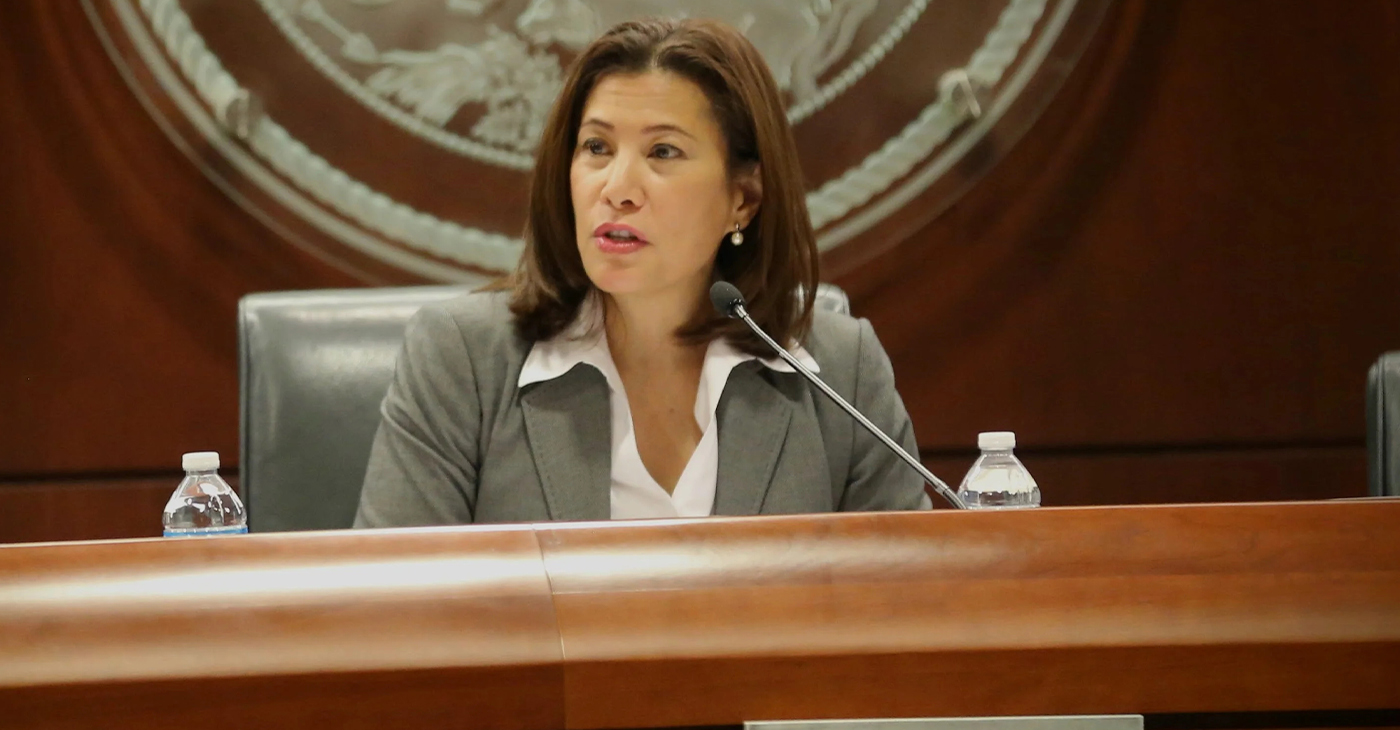Commentary
COMMENTARY: Can You Name the Chief Justice of California’s Supreme Court? Get to Know Tani Cantil-Sakauye Before She Steps Down
If a judge’s job is to stay above it all and concentrate on the work at hand, then the fact that the chief justice of California’s State Supreme Court, Tani Cantil-Sakauye, is not exactly a household name testifies to her ability to have done her job exceedingly well — impartially. With hardly an objection. Without making the news.

By Emil Guillermo
For the last 12 years, the chief justice of California’s State Supreme Court has been Tani Cantil-Sakauye, a history-making Filipino American, the first person of color and the second female ever to hold the position.
Of course, you can say her name, but just in case, here’s a pronouncer: Con-TEEL-Saw-ka-OO-yay.)
If a judge’s job is to stay above it all and concentrate on the work at hand, then the fact that Cantil-Sakauye is not exactly a household name testifies to her ability to have done her job exceedingly well — impartially. With hardly an objection. Without making the news.
That’s why I was shocked to hear Cantil-Sakauye’s announced her retirement on July 27 at age 62.
Cantil-Sakauye described the reaction from colleagues about news of her departure as “moans and groans and exclamations of concern and dismay and congratulations.”
But just marvel at what she’s left us. A state judicial environment where consensus is enabled in the pursuit of fairness under the rule of law.
Instead of a fragmented court constantly drawn into issues of rancor and division, California’s high court has been collegial and focused on its job. It’s a court that in Cantil-Sakauye’s words is now “solid and sustainable.” And perhaps that is the reason she has set a retirement date of January 1.
Appointed by then Gov. Arnold Schwarzenegger, a Republican, Cantil-Sakauye took her oath in 2011.
She’s guided the court system as its top administrator through budget cuts to budget surpluses, through COVID-19 shutdowns to ideological stagnation.
Once seen as a stodgy conservative bunch, with Cantil-Sakauye at the helm the high court has evolved into an institution shaped by Governor Newsom and his predecessor Jerry Brown, both Democrats.
People forget that Cantil-Sakauye was a Republican who worked her way up in her hometown of Sacramento, from a county prosecutor to cabinet positions under Republican Gov. George Deukmejian. She was a state appellate judge before her appointment to the state’s high court.
She garnered national attention in 2017 when she criticized federal agents for arresting immigrants in California’s state courthouses. Cantil-Sakauye saw it as eroding trust in the state courts and called it “stalking.”
Later in December 2018, she left the Republican Party after watching the Senate hearings for Judge Brett Kavanaugh and registered as an independent.
It’s hard to imagine Cantil-Sakauye is done in January when she’ll be just 63.
Biden and Feinstein think that 63 is the infancy of a career in elected politics.
But politics would be a natural thing for Cantil-Sakauye, whose inspiring origin story has voter appeal.
Consider how her Filipino-Portuguese father, Clarence Cantil, worked the pineapple plantations before coming to California. Her mother, Mary Gorre, a Filipina, was a migrant worker who followed the crops. Cantil-Sakauye grew up humbly and has said publicly that she remembers her mother’s savings guiding her principles about hard work being rewarded and providing the opportunities in the American Dream.
More dominant were phrases like, “There for the grace of God go you,” and “You listen to everyone because everyone has something to say,” the latter she admits has helped her in her work to this day. And perhaps that explains her conservative, but empathic nature.
After two years at junior college, Cantil-Sakauye went to UC Davis for her B.A. She also got her law degree from Davis, all while working as a waitress and blackjack dealer in Lake Tahoe.
At age 35, and already moving up the conservative ranks, she was Ms. Cantil-Gorre until she married Mark Sakauye, a retired Sacramento police lieutenant.
Her hyphenated name merges some major Asian American histories. The Hawaii plantations, the California fields, and her husband’s story, the son of farmworkers who became farmers and then were incarcerated in concentration camps. Cantil-Sakauye said the stories of her in-law’s struggles made her more of an immigrant rights advocate.
Could that be a hint of the future?
For now, we have four more months to notice and appreciate Chief Justice Tani Cantil-Sakauye as she winds down the historic nature of her tenure.
Emil Guillermo is a journalist and commentator. See his work at www.amok.com
Activism
Oakland Post: Week of April 24 – 30, 2024
The printed Weekly Edition of the Oakland Post: Week of April 24 – 30, 2024

To enlarge your view of this issue, use the slider, magnifying glass icon or full page icon in the lower right corner of the browser window. ![]()
Activism
Oakland Post: Week of April 17 – 23, 2024
The printed Weekly Edition of the Oakland Post: Week of April 17 – 23, 2024

To enlarge your view of this issue, use the slider, magnifying glass icon or full page icon in the lower right corner of the browser window. ![]()
Commentary
Opinion: Surviving the Earthquake, an Eclipse and “Emil Amok.”
Last Friday, a 4.8 magnitude earthquake shook New York City, reported as the “biggest earthquake with an epicenter in the NYC area since 1884” when a 5.2 quake hit. A bit bigger. The last quake similar to Friday’s was a 4.9 in 1783.Alexander Hamilton felt it — 241 years ago. That’s why New Yorkers were freaking out on Friday. They were in the room where it happens.

By Emil Guillermo
I’m a Northern Californian in New York City for the next few weeks, doing my one-man show, “Emil Amok, Lost NPR Host, Wiley Filipino, Vegan Transdad.”
I must like performing in the wake of Mother Nature.
Last Friday, a 4.8 magnitude earthquake shook New York City, reported as the “biggest earthquake with an epicenter in the NYC area since 1884” when a 5.2 quake hit. A bit bigger. The last quake similar to Friday’s was a 4.9 in 1783.
Alexander Hamilton felt it — 241 years ago.
That’s why New Yorkers were freaking out on Friday. They were in the room where it happens.
And it just doesn’t happen that often.
Beyonce singing country music happens more frequently.
When I felt New York shake last week, it reminded me of a time in a San Francisco TV newsroom when editors fretted about a lack of news an hour before showtime.
Then the office carpeting moved for a good ten seconds, and the news gods gave us our lead story.
On Friday when it happened in NYC, I noticed the lines in the carpeting in my room wiggling. But I thought it was from a raucous hotel worker vacuuming nearby.
I didn’t even think earthquake. In New York?
I just went about my business as if nothing had happened. After living near fault lines all my life, I was taking things for granted.
Considering the age of structures in New York, I should have been even more concerned about falling objects inside (shelves, stuff on walls) and outside buildings (signs, scaffolding), fire hazards from possible gas leaks, and then I should have looked for others on my floor and in the hotel lobby to confirm or aid or tell stories.
Of course, as a Californian who has lived through and covered quakes in the 4 to 6 magnitude range, I tried to calm down any traumatized New Yorker I encountered by taking full responsibility for bringing in the quake from the Bay Area.
I reassured them things would be all right, and then let them know that 4.8s are nothing.
And then I invited them to my consoling post-Earthquake performance of “Emil Amok, Lost NPR Host…”
It was the night of the eclipse.
ECLIPSING THE ECLIPSE
In New York City, the eclipse was about 90 percent visible. Good enough for me. Though a full solar eclipse is a celestial rarity, blockages of any sort aren’t generally celebrated. My one-man play is about growing up with the eclipsed history of American Filipinos and how I struggle to unblock all that.
For example, did you know the first Filipinos actually arrived to what is now California in 1587? That’s 33 years before the Pilgrims arrived in America on the other coast, but few know the Filipino history which has been totally eclipsed.
I was in Battery Park sitting on a bench and there was a sense of community as people all came to look up. A young woman sitting next to me had a filter for a cell phone camera. We began talking and she let me use it. That filter enabled me to take a picture of the main event with my iPhone.
For helping me see, I invited her and her boyfriend to come see my show.
Coincidentally, she was from Plymouth, Massachusetts, near the rock that says the year the Pilgrims landed in 1620.
In my show she learned the truth. The Pilgrims were second.
History unblocked. But it took a solar eclipse.
Next one in 2044? We have a lot more unblocking to do.
If you’re in New York come see my show, Sat. April 13th, 5:20 pm Eastern; Fri. April 19, 8:10 pm Eastern; and Sun. April 21st 5:20 pm Eastern.
You can also livestream the show. Get tickets at www.amok.com/tickets
About the Author
Emil Guillermo is a journalist and commentator. He does a mini-talk show on YouTube.com/@emilamok1. He wishes all his readers a Happy Easter!
-

 Activism4 weeks ago
Activism4 weeks agoOakland Post: Week of March 27 – April 2, 2024
-

 #NNPA BlackPress4 weeks ago
#NNPA BlackPress4 weeks agoBeloved Actor and Activist Louis Cameron Gossett Jr. Dies at 87
-

 Community1 week ago
Community1 week agoFinancial Assistance Bill for Descendants of Enslaved Persons to Help Them Purchase, Own, or Maintain a Home
-

 Activism3 weeks ago
Activism3 weeks agoOakland Post: Week of April 3 – 6, 2024
-

 Business2 weeks ago
Business2 weeks agoV.P. Kamala Harris: Americans With Criminal Records Will Soon Be Eligible for SBA Loans
-

 Activism2 weeks ago
Activism2 weeks agoOakland Post: Week of April 10 – 16, 2024
-

 Community2 weeks ago
Community2 weeks agoAG Bonta Says Oakland School Leaders Should Comply with State Laws to Avoid ‘Disparate Harm’ When Closing or Merging Schools
-

 Community6 days ago
Community6 days agoOakland WNBA Player to be Inducted Into Hall of Fame






















































